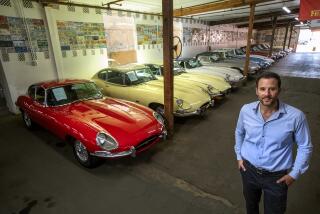Albania Benz the Barriers to Luxury Imports
- Share via
DURRES, Albania — For those perplexed by the preponderance of sleek Mercedes-Benz sedans on the potholed roads of a country that is, by a long shot, the poorest in Europe, there is a simple explanation: Most of them are stolen.
The lawlessness that has prevailed in Albania since hard-line communism was overthrown 7 1/2 years ago has bonded swimmingly with the ingenuity instilled by decades of deprivation to produce a thriving automobile market in a nation where almost no one can afford a legal purchase.
Through theft, insurance fraud and bribery of notoriously corrupt officials, Albania has become the place to acquire luxury vehicles at rock-bottom prices.
“You won’t have any problem with the police, because this is Albania,” Anthanas Thanasi assures a prospective buyer of his shiny red 1995 Toyota 4-Runner, evincing confusion at the customer’s concern that the car’s suspect origin might present a problem at registration.
Tom Paje, another salesman at the Rock of Kavaje car lot, adds confidently: “There’s no need to worry about the police--all they want is a little money, and all the documents are in order.”
Neither the Ministry of Public Order, which is responsible for law enforcement and car registration, nor the state Institute for Statistics can provide official figures about the number of Mercedes sedans among the 92,196 passenger cars registered in Albania. But any observer is quickly convinced that the most coveted car on the continent makes up at least half the fleet.
With a third of the population jobless--and with most of the employed taking home only a few hundred dollars a month--the small-scale auto importers are the first to concede that Albania cannot sustain an aboveboard auto showroom.
“About 70% of the cars are stolen, mostly from Germany and Italy,” says Paje, who is trying to sell a 5-year-old Audi for about $4,000--what he figures is needed to cover his costs of acquisition and still provide a small profit.
Sellers such as Paje and Thanasi hold up clean hands when asked where their foreign wares came from and how the cars happen to be cheaper in Albania than in their countries of origin.
But others in the elaborate import and sales chain explain that Albanian sellers are not the only ones cutting legal corners.
“It works like this,” says Xhimi Kurti, a car owner and former waiter at an Italian restaurant in Hamburg, Germany. “An Albanian works for a German for a few months, and instead of getting paid, he is given the owner’s used Mercedes and a day or two head start. Then the owner reports his car as stolen.”
The car’s owner collects the insurance money, and the Albanian worker is home free, able to sell his vehicle below market value to get the cash he is owed for his illegal employment.
No bill of sale is needed to register a car in Albania, only a declaration from customs authorities that a 25% import tax has been paid on the assessed valuation of the vehicle. With the customs declaration and a document of origin--usually the registration papers, stolen along with the car--license plates and a vehicle registration card are issued by the Ministry of Public Order, says Zhaneta Dhima of the ministry’s information department.
Albania has never had car manufacturing of its own, and private ownership was forbidden until the collapse of communism in late 1991, so all cars now in Albania arrived here as individual imports through this Adriatic seaport.
Most of the cars for sale at the Rock of Kavaje, which flanks the main road running south of Durres, are older Mercedes-Benzes, from the mid-1980s, that sell here for about $3,000 to $4,000.
Buyers such as Shaqir Zajmi, a 50-year-old taxi driver from Tirana, the capital, note that the most dramatic “savings” can be realized on newer cars, such as a metallic silver 1998 Mercedes coupe priced at $20,000 that would easily cost $40,000 elsewhere in Europe.
“But not many of us have that kind of money to pay for a car,” says the former driver of Communist ministers who now shuttles around foreigners in the 1983 Mercedes he paid $5,000 for a year ago.
Asked if he doesn’t fear that police will eventually crack down on the thriving theft network, Zajmi offers the trademark Balkan shrug that says such conformity will never happen.
“Albanian police don’t have computers to check with other countries,” says the taxi driver, adding that it is not in their interests to acquire the technology to expose their own corruption.





